calsfoundation@cals.org
IQ Zoo
Founded in 1955, the IQ Zoo of Hot Springs (Garland County) allowed visitors to view animals in their natural habitats and watch them perform trained behaviors that showcased the psychological concept known as operant conditioning. The zoo, at 380 Whittington Avenue, became a destination for tourists seeking entertainment but also attracted the attention of companies such as General Mills and Walt Disney Enterprises, which were eager to market the animal performances. The IQ Zoo is the first known attraction of this type, though other tourist attractions have been based on the IQ Zoo model.
IQ Zoo founders Keller Breland and Marian Breland met while working under renowned psychologist B. F. Skinner in the early 1940s. During World War II, the Brelands and Skinner worked on a project that trained pigeons to guide missiles. After the war, in 1950, the Brelands moved to Hot Springs to build a training center for their fledgling company, Animal Behavior Enterprises, Inc., the purpose of which was to train animals to be used in the entertainment industry. In 1955, they founded the IQ Zoo to show the public the accomplishments that had been made in behavioral psychology and to showcase some of Animal Behavior Enterprises’ successful training programs. Individual exhibits charged between five cents and twenty-five cents per play, although the Brelands occasionally opened the zoo freely to the public.
The zoo had common animals, such as chickens, pigs, ducks, cats, dogs, and raccoons, performing short trained acts that demonstrated how animals could learn certain behaviors through repetition and reward. One popular demonstration featured a raccoon named Rufus who, when prompted by a light, would drop a small basketball through a hoop and count the number of baskets, returning to the back of the cage to accept his reward only after achieving four successful attempts. Another popular exhibit involved a chicken named Casey who would peck at a small baseball bat to “hit a home run” in a small controlled baseball field. After getting a hit, Casey would round the bases in the correct order and receive an edible reward. The behavior of the Brelands’ animals exhibited the training methods used in their conditioning, none of which involved punishment. The behaviors were reinforced by means of reward. Most exhibits were mechanical in design, relying on little or no human interaction once the animals were trained. The zoo quickly became one of the top tourist attractions in Hot Springs, and the Brelands’ trained animals appeared on several network television shows, including The Jack Paar Show, The Ed Sullivan Show, The Garry Moore Show, and Wild Kingdom. IQ Zoo animals were also featured in Life, Time, Reader’s Digest, True, Popular Mechanics, and other nationally circulated magazines.
Keller Breland died in June 1965, and Marian took control of the firm. She married Bob Bailey in 1976, and the IQ Zoo stayed open until about 1990. Marion Breland Bailey died in September 2001. In 2004, Bob Bailey donated one of the mechanized training boxes known as the “Bird Brains” exhibit to the Smithsonian Institution in Washington DC to add to its animal behavior exhibit.
For additional information:
Breland, Keller and Marian. “The Misbehavior of Organisms.” http://psychclassics.yorku.ca/Breland/misbehavior.htm (accessed July 29, 2023).
Deane, Ernie. “Hot Springs ‘Zoo’ is a ‘School,’ Too.” Arkansas Gazette, March 10, 1963, p. 5E.
IQ Zoo Archive. Garland County Historical Society, Hot Springs, Arkansas.
Marr, John N. “Marian Breland Bailey: The Mouse Who Reinforced.” Arkansas Historical Quarterly 61 (Spring 2002): 59–79.
Vanderbilt, Tom. “Animal Intelligence.” Smithsonian (October 2013): 70–75.
Christopher Hough
Hot Springs, Arkansas
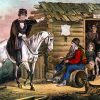 Arts, Culture, and Entertainment
Arts, Culture, and Entertainment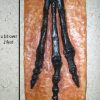 Science and Technology
Science and Technology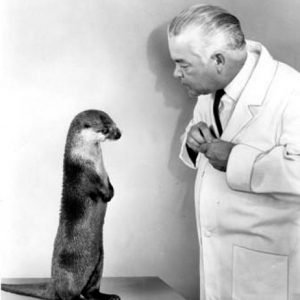 Keller Breland with Otter
Keller Breland with Otter 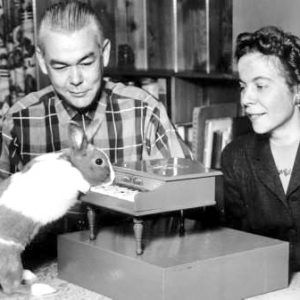 Keller and Marian Breland with IQ Zoo Rabbit
Keller and Marian Breland with IQ Zoo Rabbit 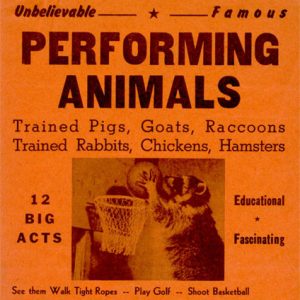 IQ Zoo Handbill
IQ Zoo Handbill 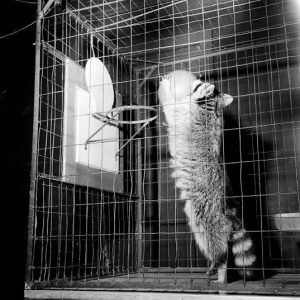 IQ Zoo Raccoon
IQ Zoo Raccoon 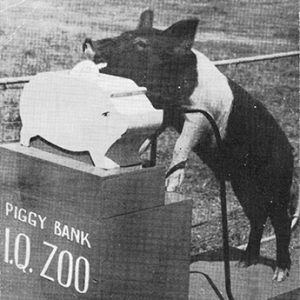 IQ Zoo Performer
IQ Zoo Performer 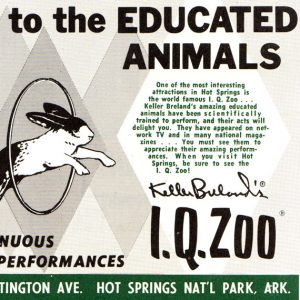 IQ Zoo Ad
IQ Zoo Ad 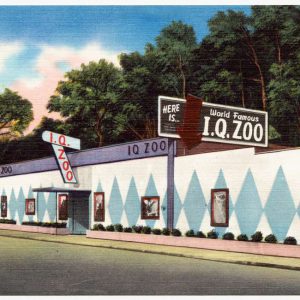 IQ Zoo Postcard
IQ Zoo Postcard 



Comments
No comments on this entry yet.